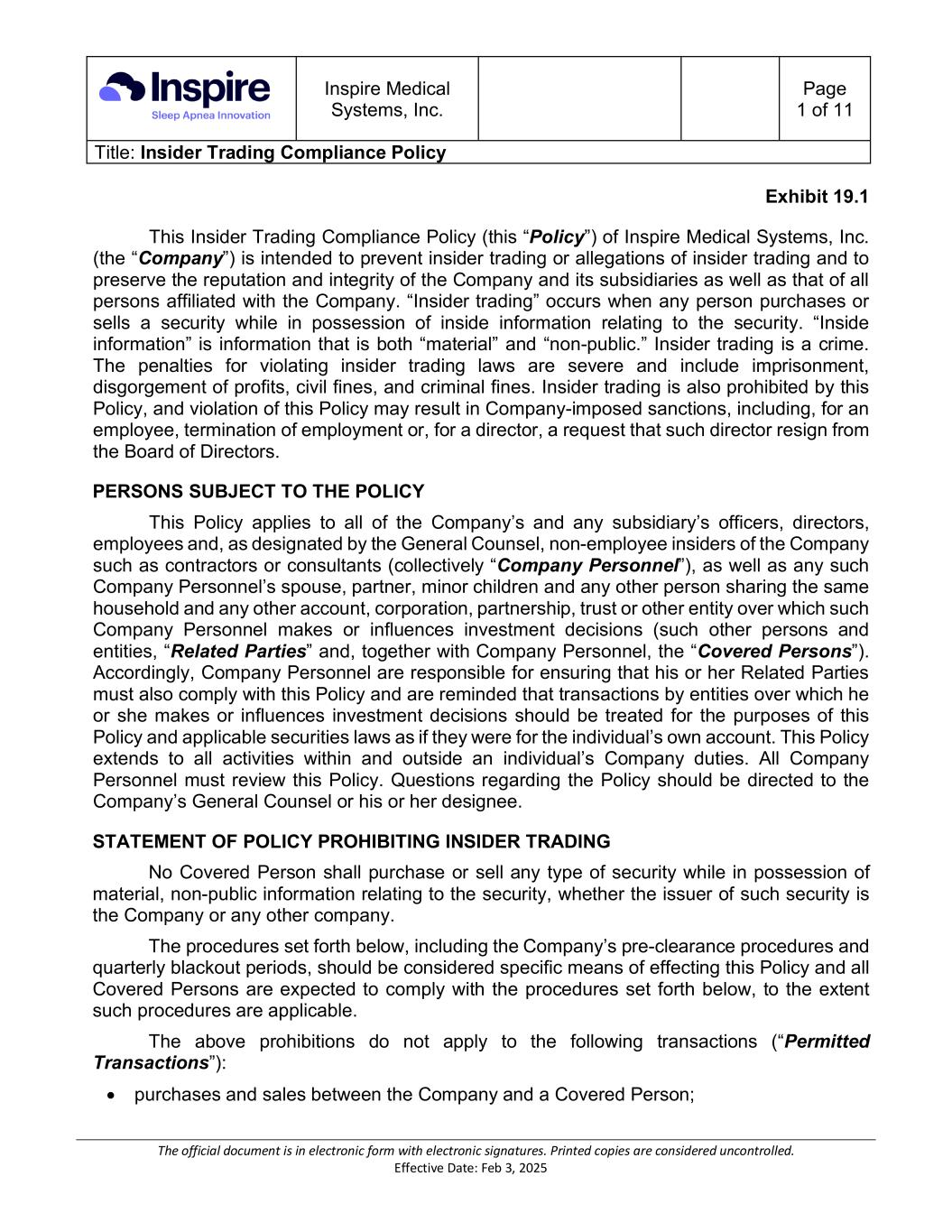
Inspire Medical Systems, Inc. Page 1 of 11 Title: Insider Trading Compliance Policy The official document is in electronic form with electronic signatures. Printed copies are considered uncontrolled. Effective Date: Feb 3, 2025 Exhibit 19.1 This Insider Trading Compliance Policy (this “Policy”) of Inspire Medical Systems, Inc. (the “Company”) is intended to prevent insider trading or allegations of insider trading and to preserve the reputation and integrity of the Company and its subsidiaries as well as that of all persons affiliated with the Company. “Insider trading” occurs when any person purchases or sells a security while in possession of inside information relating to the security. “Inside information” is information that is both “material” and “non-public.” Insider trading is a crime. The penalties for violating insider trading laws are severe and include imprisonment, disgorgement of profits, civil fines, and criminal fines. Insider trading is also prohibited by this Policy, and violation of this Policy may result in Company-imposed sanctions, including, for an employee, termination of employment or, for a director, a request that such director resign from the Board of Directors. PERSONS SUBJECT TO THE POLICY This Policy applies to all of the Company’s and any subsidiary’s officers, directors, employees and, as designated by the General Counsel, non-employee insiders of the Company such as contractors or consultants (collectively “Company Personnel”), as well as any such Company Personnel’s spouse, partner, minor children and any other person sharing the same household and any other account, corporation, partnership, trust or other entity over which such Company Personnel makes or influences investment decisions (such other persons and entities, “Related Parties” and, together with Company Personnel, the “Covered Persons”). Accordingly, Company Personnel are responsible for ensuring that his or her Related Parties must also comply with this Policy and are reminded that transactions by entities over which he or she makes or influences investment decisions should be treated for the purposes of this Policy and applicable securities laws as if they were for the individual’s own account. This Policy extends to all activities within and outside an individual’s Company duties. All Company Personnel must review this Policy. Questions regarding the Policy should be directed to the Company’s General Counsel or his or her designee. STATEMENT OF POLICY PROHIBITING INSIDER TRADING No Covered Person shall purchase or sell any type of security while in possession of material, non-public information relating to the security, whether the issuer of such security is the Company or any other company. The procedures set forth below, including the Company’s pre-clearance procedures and quarterly blackout periods, should be considered specific means of effecting this Policy and all Covered Persons are expected to comply with the procedures set forth below, to the extent such procedures are applicable. The above prohibitions do not apply to the following transactions (“Permitted Transactions”): • purchases and sales between the Company and a Covered Person;
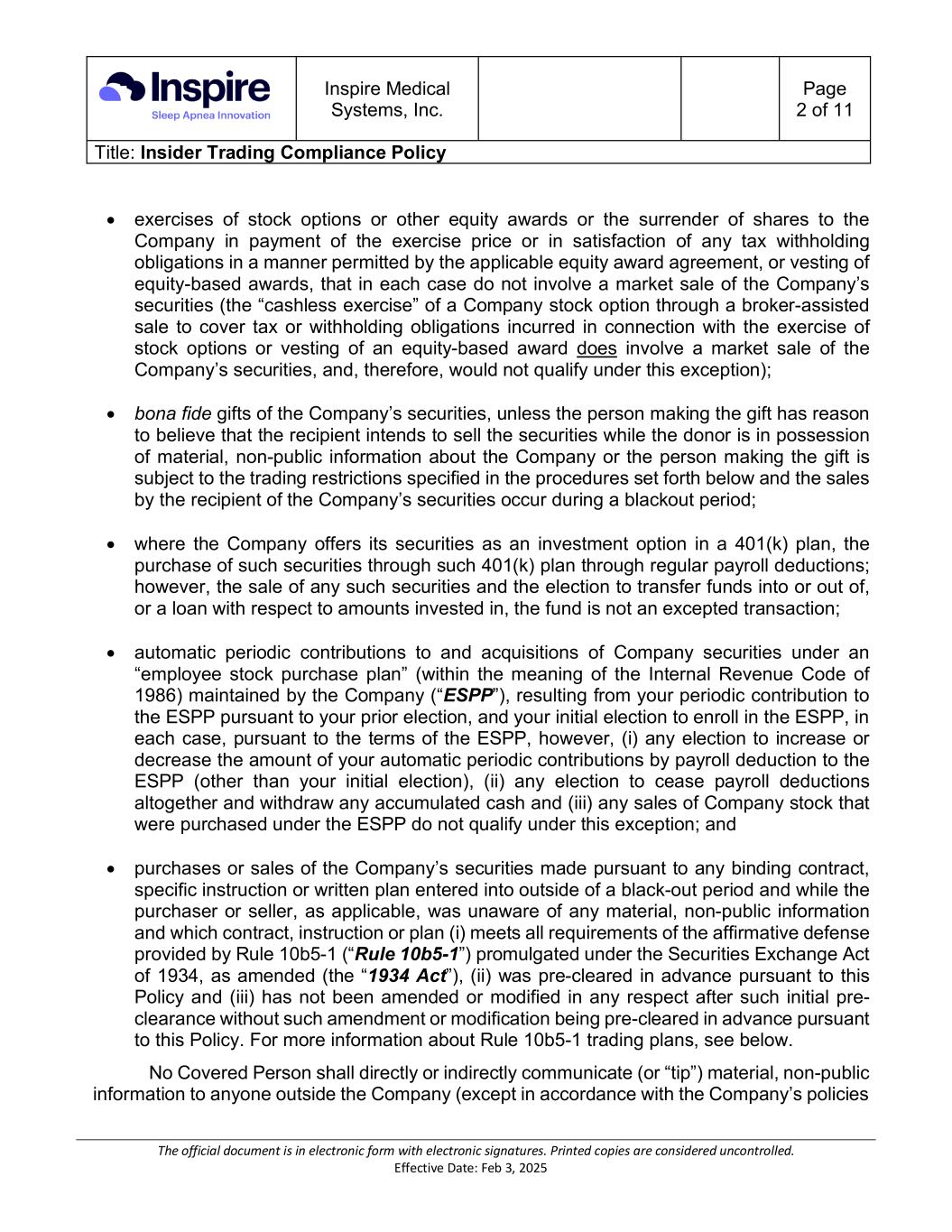
Inspire Medical Systems, Inc. Page 2 of 11 Title: Insider Trading Compliance Policy The official document is in electronic form with electronic signatures. Printed copies are considered uncontrolled. Effective Date: Feb 3, 2025 • exercises of stock options or other equity awards or the surrender of shares to the Company in payment of the exercise price or in satisfaction of any tax withholding obligations in a manner permitted by the applicable equity award agreement, or vesting of equity-based awards, that in each case do not involve a market sale of the Company’s securities (the “cashless exercise” of a Company stock option through a broker-assisted sale to cover tax or withholding obligations incurred in connection with the exercise of stock options or vesting of an equity-based award does involve a market sale of the Company’s securities, and, therefore, would not qualify under this exception); • bona fide gifts of the Company’s securities, unless the person making the gift has reason to believe that the recipient intends to sell the securities while the donor is in possession of material, non-public information about the Company or the person making the gift is subject to the trading restrictions specified in the procedures set forth below and the sales by the recipient of the Company’s securities occur during a blackout period; • where the Company offers its securities as an investment option in a 401(k) plan, the purchase of such securities through such 401(k) plan through regular payroll deductions; however, the sale of any such securities and the election to transfer funds into or out of, or a loan with respect to amounts invested in, the fund is not an excepted transaction; • automatic periodic contributions to and acquisitions of Company securities under an “employee stock purchase plan” (within the meaning of the Internal Revenue Code of 1986) maintained by the Company (“ESPP”), resulting from your periodic contribution to the ESPP pursuant to your prior election, and your initial election to enroll in the ESPP, in each case, pursuant to the terms of the ESPP, however, (i) any election to increase or decrease the amount of your automatic periodic contributions by payroll deduction to the ESPP (other than your initial election), (ii) any election to cease payroll deductions altogether and withdraw any accumulated cash and (iii) any sales of Company stock that were purchased under the ESPP do not qualify under this exception; and • purchases or sales of the Company’s securities made pursuant to any binding contract, specific instruction or written plan entered into outside of a black-out period and while the purchaser or seller, as applicable, was unaware of any material, non-public information and which contract, instruction or plan (i) meets all requirements of the affirmative defense provided by Rule 10b5-1 (“Rule 10b5-1”) promulgated under the Securities Exchange Act of 1934, as amended (the “1934 Act”), (ii) was pre-cleared in advance pursuant to this Policy and (iii) has not been amended or modified in any respect after such initial pre- clearance without such amendment or modification being pre-cleared in advance pursuant to this Policy. For more information about Rule 10b5-1 trading plans, see below. No Covered Person shall directly or indirectly communicate (or “tip”) material, non-public information to anyone outside the Company (except in accordance with the Company’s policies
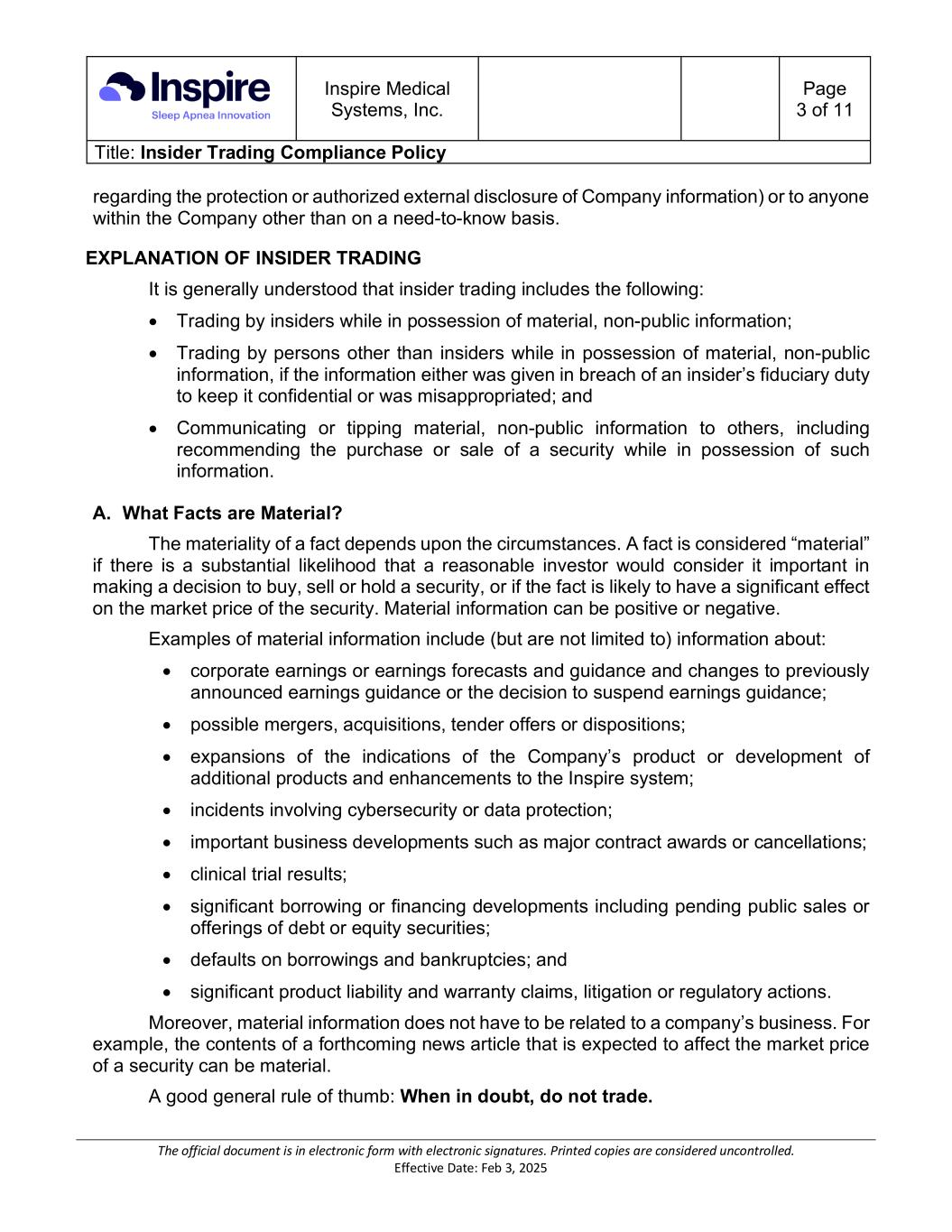
Inspire Medical Systems, Inc. Page 3 of 11 Title: Insider Trading Compliance Policy The official document is in electronic form with electronic signatures. Printed copies are considered uncontrolled. Effective Date: Feb 3, 2025 regarding the protection or authorized external disclosure of Company information) or to anyone within the Company other than on a need-to-know basis. EXPLANATION OF INSIDER TRADING It is generally understood that insider trading includes the following: • Trading by insiders while in possession of material, non-public information; • Trading by persons other than insiders while in possession of material, non-public information, if the information either was given in breach of an insider’s fiduciary duty to keep it confidential or was misappropriated; and • Communicating or tipping material, non-public information to others, including recommending the purchase or sale of a security while in possession of such information. A. What Facts are Material? The materiality of a fact depends upon the circumstances. A fact is considered “material” if there is a substantial likelihood that a reasonable investor would consider it important in making a decision to buy, sell or hold a security, or if the fact is likely to have a significant effect on the market price of the security. Material information can be positive or negative. Examples of material information include (but are not limited to) information about: • corporate earnings or earnings forecasts and guidance and changes to previously announced earnings guidance or the decision to suspend earnings guidance; • possible mergers, acquisitions, tender offers or dispositions; • expansions of the indications of the Company’s product or development of additional products and enhancements to the Inspire system; • incidents involving cybersecurity or data protection; • important business developments such as major contract awards or cancellations; • clinical trial results; • significant borrowing or financing developments including pending public sales or offerings of debt or equity securities; • defaults on borrowings and bankruptcies; and • significant product liability and warranty claims, litigation or regulatory actions. Moreover, material information does not have to be related to a company’s business. For example, the contents of a forthcoming news article that is expected to affect the market price of a security can be material. A good general rule of thumb: When in doubt, do not trade.
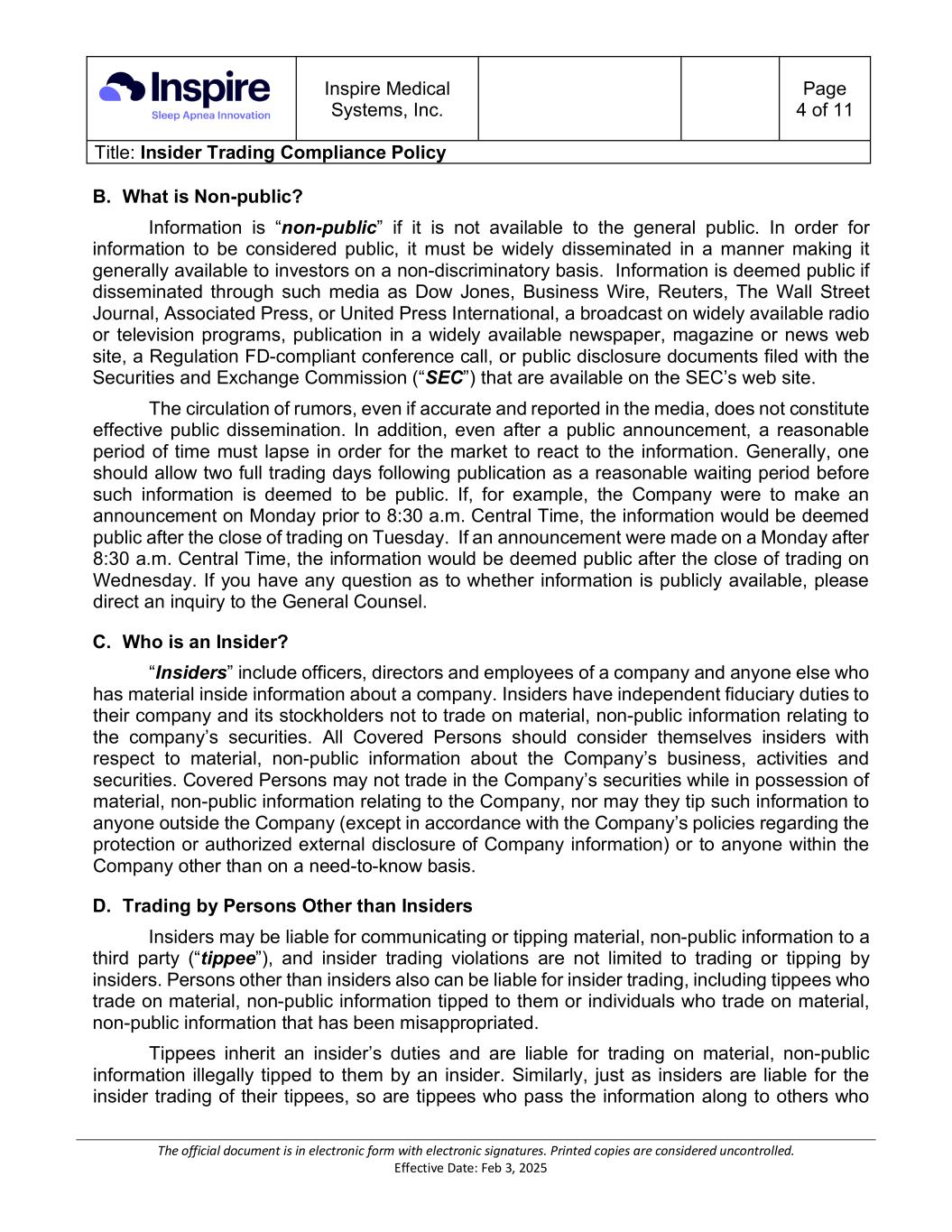
Inspire Medical Systems, Inc. Page 4 of 11 Title: Insider Trading Compliance Policy The official document is in electronic form with electronic signatures. Printed copies are considered uncontrolled. Effective Date: Feb 3, 2025 B. What is Non-public? Information is “non-public” if it is not available to the general public. In order for information to be considered public, it must be widely disseminated in a manner making it generally available to investors on a non-discriminatory basis. Information is deemed public if disseminated through such media as Dow Jones, Business Wire, Reuters, The Wall Street Journal, Associated Press, or United Press International, a broadcast on widely available radio or television programs, publication in a widely available newspaper, magazine or news web site, a Regulation FD-compliant conference call, or public disclosure documents filed with the Securities and Exchange Commission (“SEC”) that are available on the SEC’s web site. The circulation of rumors, even if accurate and reported in the media, does not constitute effective public dissemination. In addition, even after a public announcement, a reasonable period of time must lapse in order for the market to react to the information. Generally, one should allow two full trading days following publication as a reasonable waiting period before such information is deemed to be public. If, for example, the Company were to make an announcement on Monday prior to 8:30 a.m. Central Time, the information would be deemed public after the close of trading on Tuesday. If an announcement were made on a Monday after 8:30 a.m. Central Time, the information would be deemed public after the close of trading on Wednesday. If you have any question as to whether information is publicly available, please direct an inquiry to the General Counsel. C. Who is an Insider? “Insiders” include officers, directors and employees of a company and anyone else who has material inside information about a company. Insiders have independent fiduciary duties to their company and its stockholders not to trade on material, non-public information relating to the company’s securities. All Covered Persons should consider themselves insiders with respect to material, non-public information about the Company’s business, activities and securities. Covered Persons may not trade in the Company’s securities while in possession of material, non-public information relating to the Company, nor may they tip such information to anyone outside the Company (except in accordance with the Company’s policies regarding the protection or authorized external disclosure of Company information) or to anyone within the Company other than on a need-to-know basis. D. Trading by Persons Other than Insiders Insiders may be liable for communicating or tipping material, non-public information to a third party (“tippee”), and insider trading violations are not limited to trading or tipping by insiders. Persons other than insiders also can be liable for insider trading, including tippees who trade on material, non-public information tipped to them or individuals who trade on material, non-public information that has been misappropriated. Tippees inherit an insider’s duties and are liable for trading on material, non-public information illegally tipped to them by an insider. Similarly, just as insiders are liable for the insider trading of their tippees, so are tippees who pass the information along to others who
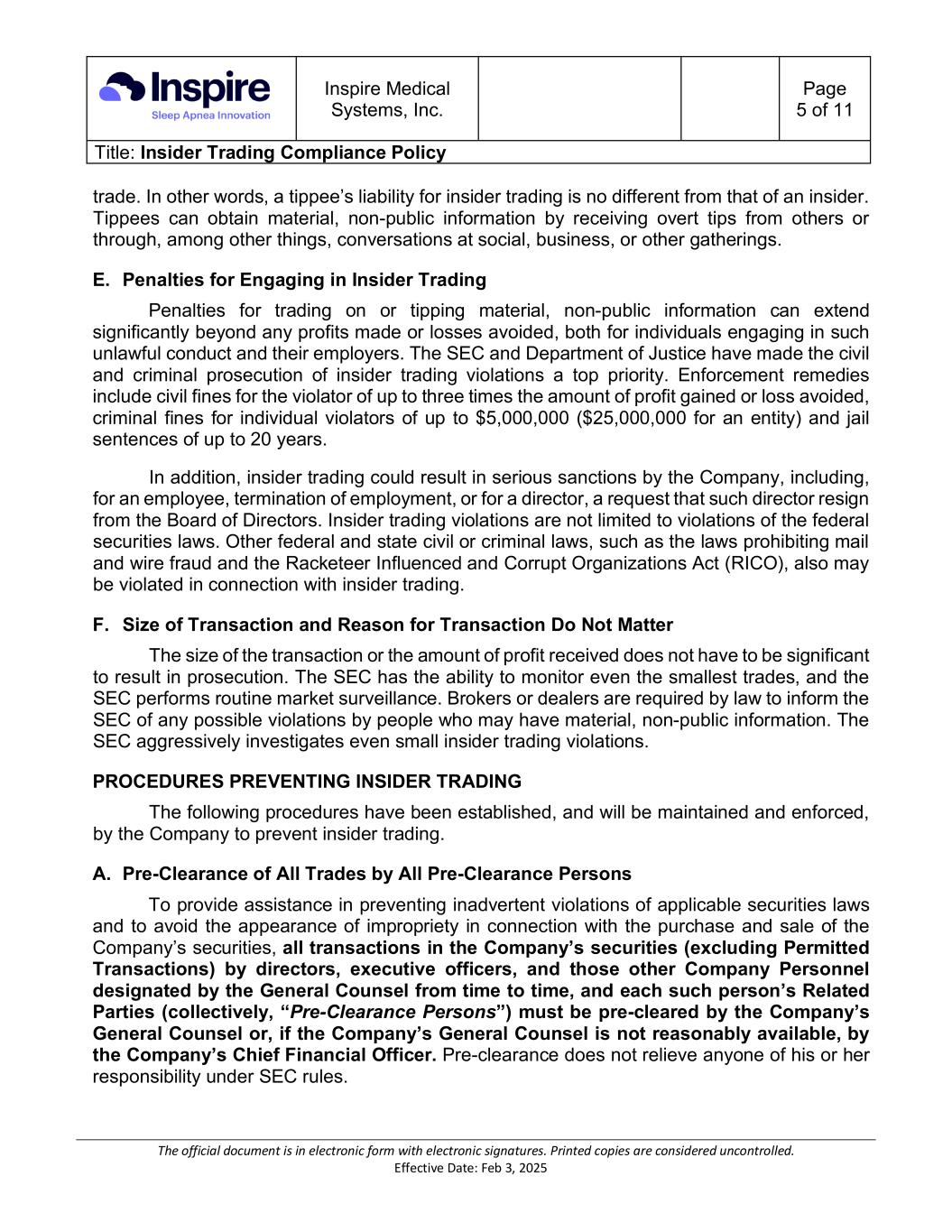
Inspire Medical Systems, Inc. Page 5 of 11 Title: Insider Trading Compliance Policy The official document is in electronic form with electronic signatures. Printed copies are considered uncontrolled. Effective Date: Feb 3, 2025 trade. In other words, a tippee’s liability for insider trading is no different from that of an insider. Tippees can obtain material, non-public information by receiving overt tips from others or through, among other things, conversations at social, business, or other gatherings. E. Penalties for Engaging in Insider Trading Penalties for trading on or tipping material, non-public information can extend significantly beyond any profits made or losses avoided, both for individuals engaging in such unlawful conduct and their employers. The SEC and Department of Justice have made the civil and criminal prosecution of insider trading violations a top priority. Enforcement remedies include civil fines for the violator of up to three times the amount of profit gained or loss avoided, criminal fines for individual violators of up to $5,000,000 ($25,000,000 for an entity) and jail sentences of up to 20 years. In addition, insider trading could result in serious sanctions by the Company, including, for an employee, termination of employment, or for a director, a request that such director resign from the Board of Directors. Insider trading violations are not limited to violations of the federal securities laws. Other federal and state civil or criminal laws, such as the laws prohibiting mail and wire fraud and the Racketeer Influenced and Corrupt Organizations Act (RICO), also may be violated in connection with insider trading. F. Size of Transaction and Reason for Transaction Do Not Matter The size of the transaction or the amount of profit received does not have to be significant to result in prosecution. The SEC has the ability to monitor even the smallest trades, and the SEC performs routine market surveillance. Brokers or dealers are required by law to inform the SEC of any possible violations by people who may have material, non-public information. The SEC aggressively investigates even small insider trading violations. PROCEDURES PREVENTING INSIDER TRADING The following procedures have been established, and will be maintained and enforced, by the Company to prevent insider trading. A. Pre-Clearance of All Trades by All Pre-Clearance Persons To provide assistance in preventing inadvertent violations of applicable securities laws and to avoid the appearance of impropriety in connection with the purchase and sale of the Company’s securities, all transactions in the Company’s securities (excluding Permitted Transactions) by directors, executive officers, and those other Company Personnel designated by the General Counsel from time to time, and each such person’s Related Parties (collectively, “Pre-Clearance Persons”) must be pre-cleared by the Company’s General Counsel or, if the Company’s General Counsel is not reasonably available, by the Company’s Chief Financial Officer. Pre-clearance does not relieve anyone of his or her responsibility under SEC rules.

Inspire Medical Systems, Inc. Page 6 of 11 Title: Insider Trading Compliance Policy The official document is in electronic form with electronic signatures. Printed copies are considered uncontrolled. Effective Date: Feb 3, 2025 A request for pre-clearance shall be in writing (including without limitation by e-mail), should be made at least two business days in advance of the proposed transaction and should include the identity of the Pre-Clearance Person, the type of proposed transaction (for example, an open market purchase, a privately negotiated sale, an option exercise, a gift, a transfer, etc.), the proposed date of the transaction and the number of shares or other securities to be involved. The General Counsel shall have sole discretion to decide whether to clear any contemplated transaction. (The Chief Executive Officer shall have sole discretion to decide whether to clear transactions by the General Counsel or persons or entities subject to this policy as a result of their relationship with the General Counsel.) All trades that are pre-cleared must be effected within five business days of receipt of the pre-clearance unless a specific exception has been granted by the General Counsel (or the Chief Executive Officer, in the case of the General Counsel or persons or entities subject to this policy as a result of their relationship with the General Counsel). A pre-cleared trade (or any portion of a pre-cleared trade) that has not been effected during the five business day period (or other period as approved by the General Counsel or Chief Executive Officer, as applicable) must be pre-cleared again prior to execution. Notwithstanding receipt of pre-clearance, if the Pre-Clearance Person becomes aware of material non-public information or becomes subject to a black-out period before the transaction is effected, the transaction may not be completed. B. Black-Out Periods Additionally, directors, executive officers, and those other Company Personnel designated by the General Counsel from time to time, and each such person’s Related Parties (collectively, “Trading Window Persons”) shall not purchase or sell any security of the Company during the period beginning on the first calendar day of the last month before the end of any fiscal quarter of the Company and ending upon the completion of the second full trading day after the public release of earnings data for such fiscal quarter or during any other trading suspension period declared by the Company, except for purchases and sales made pursuant to Permitted Transactions. For example, if the Company’s fourth fiscal quarter ends at 11:59 p.m., Eastern time, on December 31, the corresponding blackout period would begin at 12:01 a.m., Eastern time, on December 1. For purposes of this Policy, a “trading day” is a day on which national stock exchanges are open for trading. Exceptions to the black-out period policy may be approved only by the Company’s General Counsel (or, in the case of an exception for the General Counsel or persons or entities subject to this policy as a result of their relationship with the General Counsel, the Chief Executive Officer or, in the case of exceptions for directors or persons or entities subject to this policy as a result of their relationship with a director, the Board of Directors). From time to time, the Company, through the Board of Directors, the Company’s disclosure committee or the General Counsel, may recommend that Trading Window Persons or others suspend trading in the Company’s securities because of developments that have not yet been disclosed to the public. Subject to the Permitted Transactions noted above, all those
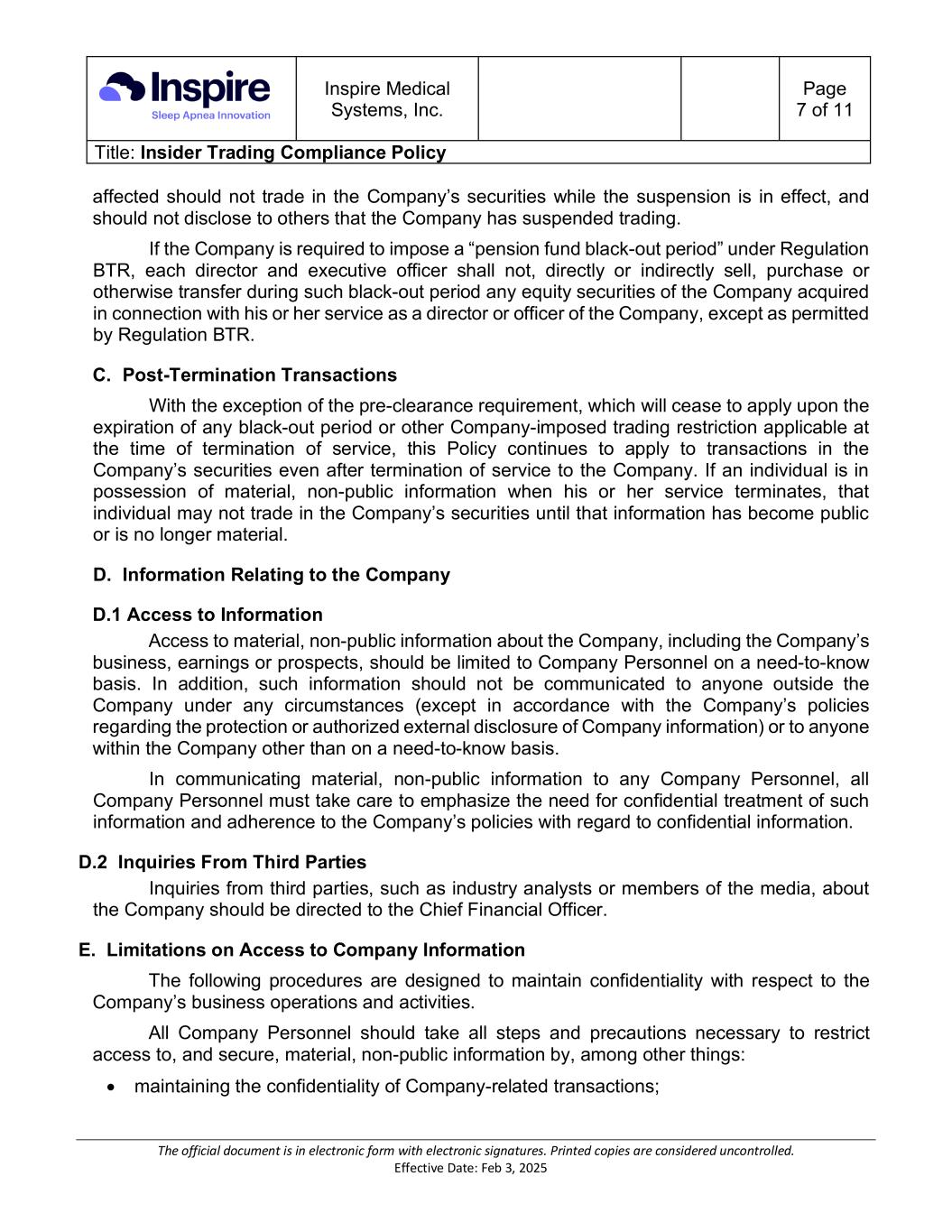
Inspire Medical Systems, Inc. Page 7 of 11 Title: Insider Trading Compliance Policy The official document is in electronic form with electronic signatures. Printed copies are considered uncontrolled. Effective Date: Feb 3, 2025 affected should not trade in the Company’s securities while the suspension is in effect, and should not disclose to others that the Company has suspended trading. If the Company is required to impose a “pension fund black-out period” under Regulation BTR, each director and executive officer shall not, directly or indirectly sell, purchase or otherwise transfer during such black-out period any equity securities of the Company acquired in connection with his or her service as a director or officer of the Company, except as permitted by Regulation BTR. C. Post-Termination Transactions With the exception of the pre-clearance requirement, which will cease to apply upon the expiration of any black-out period or other Company-imposed trading restriction applicable at the time of termination of service, this Policy continues to apply to transactions in the Company’s securities even after termination of service to the Company. If an individual is in possession of material, non-public information when his or her service terminates, that individual may not trade in the Company’s securities until that information has become public or is no longer material. D. Information Relating to the Company D.1 Access to Information Access to material, non-public information about the Company, including the Company’s business, earnings or prospects, should be limited to Company Personnel on a need-to-know basis. In addition, such information should not be communicated to anyone outside the Company under any circumstances (except in accordance with the Company’s policies regarding the protection or authorized external disclosure of Company information) or to anyone within the Company other than on a need-to-know basis. In communicating material, non-public information to any Company Personnel, all Company Personnel must take care to emphasize the need for confidential treatment of such information and adherence to the Company’s policies with regard to confidential information. D.2 Inquiries From Third Parties Inquiries from third parties, such as industry analysts or members of the media, about the Company should be directed to the Chief Financial Officer. E. Limitations on Access to Company Information The following procedures are designed to maintain confidentiality with respect to the Company’s business operations and activities. All Company Personnel should take all steps and precautions necessary to restrict access to, and secure, material, non-public information by, among other things: • maintaining the confidentiality of Company-related transactions;

Inspire Medical Systems, Inc. Page 8 of 11 Title: Insider Trading Compliance Policy The official document is in electronic form with electronic signatures. Printed copies are considered uncontrolled. Effective Date: Feb 3, 2025 • conducting their business and social activities so as not to risk inadvertent disclosure of confidential information. Review of confidential documents in public places should be conducted so as to prevent access by unauthorized persons; • restricting access to documents and files (including computer files) containing material, non-public information to individuals on a need-to-know basis (including maintaining control over the distribution of documents and drafts of documents); • promptly removing and cleaning up all confidential documents and other materials from conference rooms following the conclusion of any meetings; • disposing of all confidential documents and other papers, after there is no longer any business or other legally required need, through shredders when appropriate; • restricting access to areas likely to contain confidential documents or material, non-public information; • safeguarding laptop computers, mobile devices, tablets, memory sticks, CDs and other items that contain confidential information; and • avoiding the discussion of material, non-public information in places where the information could be overheard by others such as in elevators, restrooms, hallways, restaurants, airplanes, taxicabs or other forms of public transportation. Company Personnel involved with material, non-public information, to the extent feasible, should conduct their business and activities in areas separate from other Company activities. SPECIAL PROHIBITED TRANSACTIONS The Company has determined that there is a heightened legal risk and/or the appearance of improper or inappropriate conduct if the persons subject to this Policy engage in certain types of transactions. Therefore, Covered Persons shall comply with the following policies with respect to certain transactions in the Company securities, as applicable: A. Short Sales Short sales of the Company’s securities evidence an expectation on the part of the seller that the securities will decline in value, and therefore signal to the market that the seller has no confidence in the Company or its short-term prospects. In addition, short sales may reduce the seller’s incentive to improve the Company’s performance. For these reasons, short sales of the Company’s securities are prohibited by this Policy. In addition, Section 16(c) of the 1934 Act absolutely prohibits Section 16 reporting persons from making short sales of the Company’s equity securities, i.e., sales of shares that the insider does not own at the time of sale, or sales of shares against which the insider does not deliver the shares within 20 days after the sale.
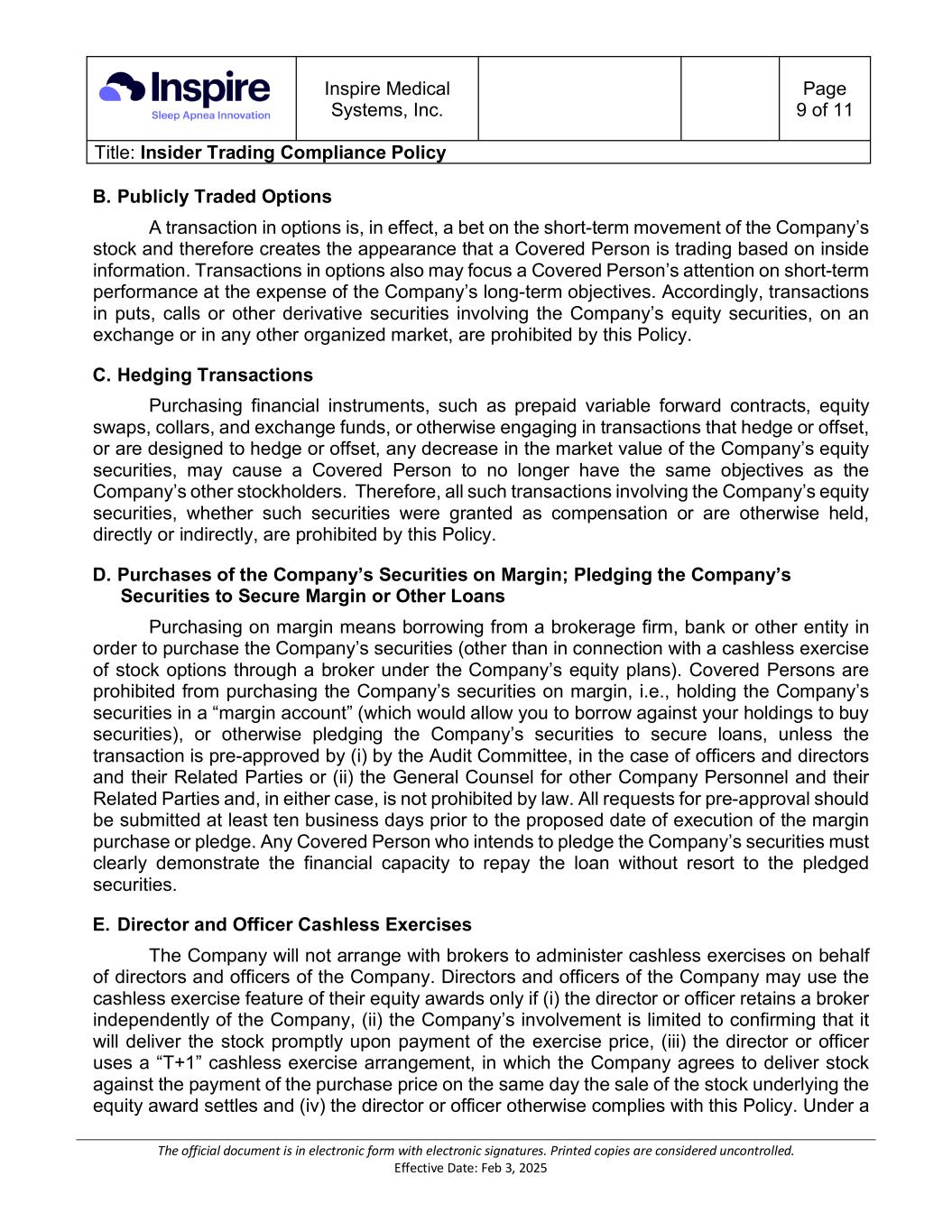
Inspire Medical Systems, Inc. Page 9 of 11 Title: Insider Trading Compliance Policy The official document is in electronic form with electronic signatures. Printed copies are considered uncontrolled. Effective Date: Feb 3, 2025 B. Publicly Traded Options A transaction in options is, in effect, a bet on the short-term movement of the Company’s stock and therefore creates the appearance that a Covered Person is trading based on inside information. Transactions in options also may focus a Covered Person’s attention on short-term performance at the expense of the Company’s long-term objectives. Accordingly, transactions in puts, calls or other derivative securities involving the Company’s equity securities, on an exchange or in any other organized market, are prohibited by this Policy. C. Hedging Transactions Purchasing financial instruments, such as prepaid variable forward contracts, equity swaps, collars, and exchange funds, or otherwise engaging in transactions that hedge or offset, or are designed to hedge or offset, any decrease in the market value of the Company’s equity securities, may cause a Covered Person to no longer have the same objectives as the Company’s other stockholders. Therefore, all such transactions involving the Company’s equity securities, whether such securities were granted as compensation or are otherwise held, directly or indirectly, are prohibited by this Policy. D. Purchases of the Company’s Securities on Margin; Pledging the Company’s Securities to Secure Margin or Other Loans Purchasing on margin means borrowing from a brokerage firm, bank or other entity in order to purchase the Company’s securities (other than in connection with a cashless exercise of stock options through a broker under the Company’s equity plans). Covered Persons are prohibited from purchasing the Company’s securities on margin, i.e., holding the Company’s securities in a “margin account” (which would allow you to borrow against your holdings to buy securities), or otherwise pledging the Company’s securities to secure loans, unless the transaction is pre-approved by (i) by the Audit Committee, in the case of officers and directors and their Related Parties or (ii) the General Counsel for other Company Personnel and their Related Parties and, in either case, is not prohibited by law. All requests for pre-approval should be submitted at least ten business days prior to the proposed date of execution of the margin purchase or pledge. Any Covered Person who intends to pledge the Company’s securities must clearly demonstrate the financial capacity to repay the loan without resort to the pledged securities. E. Director and Officer Cashless Exercises The Company will not arrange with brokers to administer cashless exercises on behalf of directors and officers of the Company. Directors and officers of the Company may use the cashless exercise feature of their equity awards only if (i) the director or officer retains a broker independently of the Company, (ii) the Company’s involvement is limited to confirming that it will deliver the stock promptly upon payment of the exercise price, (iii) the director or officer uses a “T+1” cashless exercise arrangement, in which the Company agrees to deliver stock against the payment of the purchase price on the same day the sale of the stock underlying the equity award settles and (iv) the director or officer otherwise complies with this Policy. Under a
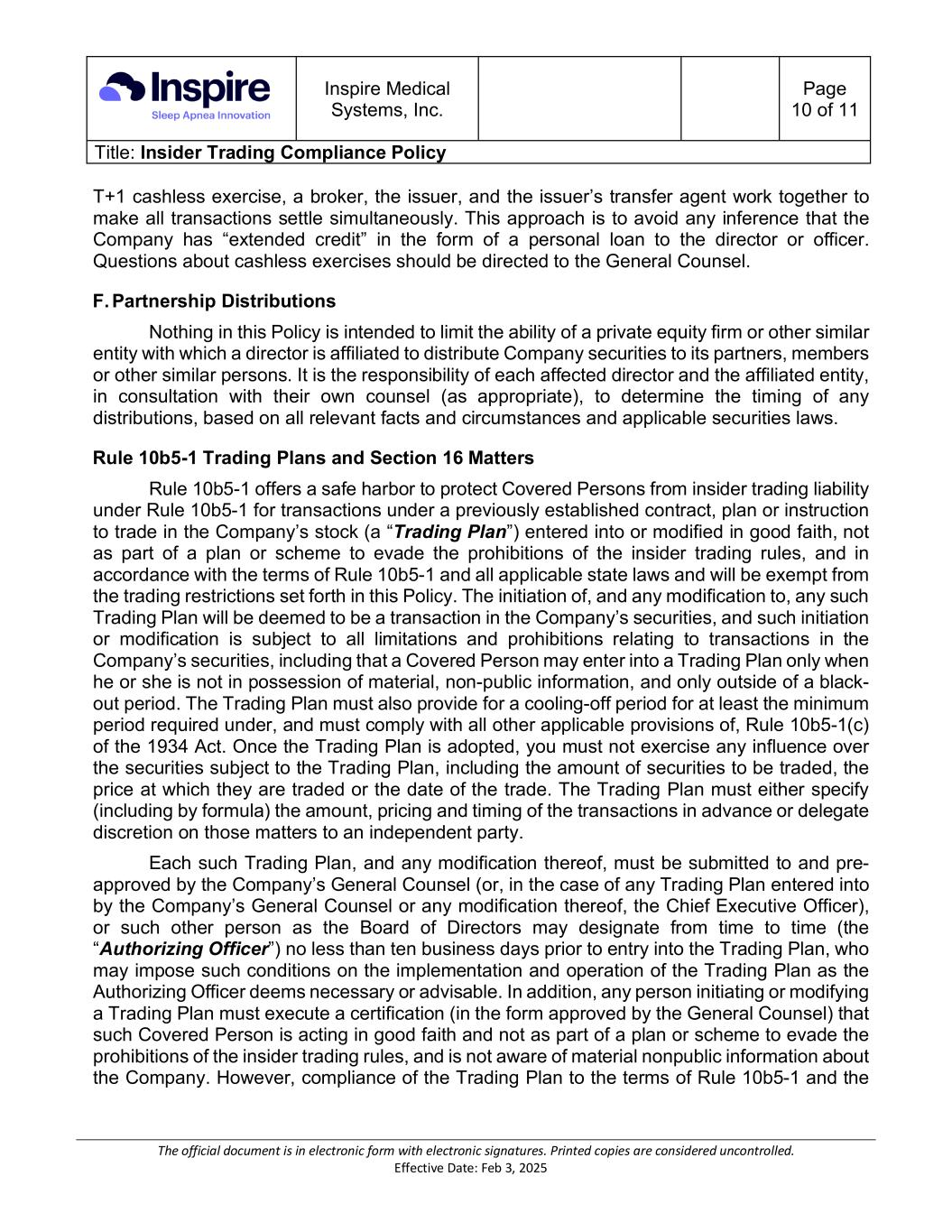
Inspire Medical Systems, Inc. Page 10 of 11 Title: Insider Trading Compliance Policy The official document is in electronic form with electronic signatures. Printed copies are considered uncontrolled. Effective Date: Feb 3, 2025 T+1 cashless exercise, a broker, the issuer, and the issuer’s transfer agent work together to make all transactions settle simultaneously. This approach is to avoid any inference that the Company has “extended credit” in the form of a personal loan to the director or officer. Questions about cashless exercises should be directed to the General Counsel. F. Partnership Distributions Nothing in this Policy is intended to limit the ability of a private equity firm or other similar entity with which a director is affiliated to distribute Company securities to its partners, members or other similar persons. It is the responsibility of each affected director and the affiliated entity, in consultation with their own counsel (as appropriate), to determine the timing of any distributions, based on all relevant facts and circumstances and applicable securities laws. Rule 10b5-1 Trading Plans and Section 16 Matters Rule 10b5-1 offers a safe harbor to protect Covered Persons from insider trading liability under Rule 10b5-1 for transactions under a previously established contract, plan or instruction to trade in the Company’s stock (a “Trading Plan”) entered into or modified in good faith, not as part of a plan or scheme to evade the prohibitions of the insider trading rules, and in accordance with the terms of Rule 10b5-1 and all applicable state laws and will be exempt from the trading restrictions set forth in this Policy. The initiation of, and any modification to, any such Trading Plan will be deemed to be a transaction in the Company’s securities, and such initiation or modification is subject to all limitations and prohibitions relating to transactions in the Company’s securities, including that a Covered Person may enter into a Trading Plan only when he or she is not in possession of material, non-public information, and only outside of a black- out period. The Trading Plan must also provide for a cooling-off period for at least the minimum period required under, and must comply with all other applicable provisions of, Rule 10b5-1(c) of the 1934 Act. Once the Trading Plan is adopted, you must not exercise any influence over the securities subject to the Trading Plan, including the amount of securities to be traded, the price at which they are traded or the date of the trade. The Trading Plan must either specify (including by formula) the amount, pricing and timing of the transactions in advance or delegate discretion on those matters to an independent party. Each such Trading Plan, and any modification thereof, must be submitted to and pre- approved by the Company’s General Counsel (or, in the case of any Trading Plan entered into by the Company’s General Counsel or any modification thereof, the Chief Executive Officer), or such other person as the Board of Directors may designate from time to time (the “Authorizing Officer”) no less than ten business days prior to entry into the Trading Plan, who may impose such conditions on the implementation and operation of the Trading Plan as the Authorizing Officer deems necessary or advisable. In addition, any person initiating or modifying a Trading Plan must execute a certification (in the form approved by the General Counsel) that such Covered Person is acting in good faith and not as part of a plan or scheme to evade the prohibitions of the insider trading rules, and is not aware of material nonpublic information about the Company. However, compliance of the Trading Plan to the terms of Rule 10b5-1 and the

Inspire Medical Systems, Inc. Page 11 of 11 Title: Insider Trading Compliance Policy The official document is in electronic form with electronic signatures. Printed copies are considered uncontrolled. Effective Date: Feb 3, 2025 execution of transactions pursuant to the Trading Plan are the sole responsibility of the person initiating the Trading Plan, not the Company or the Authorizing Officer. Trading Plans do not exempt individuals from complying with Section 16 reporting requirements or being subject to short-swing profit rules or liability. Those Covered Persons who are interested in initiating a Trading Plan should consult the Company’s separate memo to directors and officers of the Company that covers reporting obligations under Section 16(a), the recovery of profits under Section 16(b), short-sale prohibitions under Section 16(c), and Rule 144 and contains more details on how Trading Plans work and additional Company requirements. EXECUTION AND RETURN OF CERTIFICATION OF COMPLIANCE For Inspire employees, by reading the Insider Trading Compliance Policy, completing the online policy training, and providing an electronic signature, they are agreeing to comply fully with the policy. For other non-employee Covered Persons, after reading this Policy, they should execute and return to the Company’s General Counsel a certification of compliance form, which form will be maintained by the General Counsel or his or her designee and available upon request.










